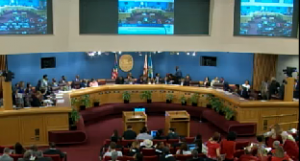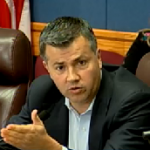Not many people were surprised by the Miami-Dade County Commission’s decision Wednesday to  ignore the petition of 127,000 voters who clamor for campaign finance reform in our pay-to-play county government.
ignore the petition of 127,000 voters who clamor for campaign finance reform in our pay-to-play county government.
And it’s not like they didn’t have good reason.
Even the petition gatherers — a group calling itself An Accountable Miami-Dade — had already filed a lawsuit in the court. Even before Wednesday’s meeting, the county attorney had already said last month that the language for the ballot question that the petition was based on was legally insufficient — a term used to discredit the work done by dozens or perhaps hundreds of volunteers.
The group itself was also discredited. Exposed as part of a national phenomenon with labor and Democratic Party interests at the wheel rather than the grassroots effort it claims to be, Accountable took a beating on the dais Wednesday. Perhaps they deserve it a bit. The connect the dots to special interests is undeniable and they did try to pass themselves off as just one of us.
Read related story: After stalling, Miami-Dade Commission to meet on ballot issue
“I love to have people get involved and engaged and the fact that they signed these petitions is a good sign. But I have to question the motivation,” said Commission Juan Zapata, who wasn’t keen on having “outside interference” drive the effort.
good sign. But I have to question the motivation,” said Commission Juan Zapata, who wasn’t keen on having “outside interference” drive the effort.
Commissioners had legitimate questions about how the petition may have targeted black voters in certain neighborhoods or intentionally had it set up to go to commission during their break for a distracted, smaller group.
But others had questions about the county’s own process. The Accountable group got approval from the county clerk for the language of the petition and had no reason to think it was legally insufficient, some commissioners said.
“These people went out and collected signatures based on what they believed was sufficient. And we let it happen,” said Commissioner Barbara Jordan.
If passed, the measure would have cut maximum contributions from $1,000 to $500 and would have prohibited gifts from anyone doing business with the county. There was also some language about matching public funds for some candidates.
Ladra could never really get behind the petition itself. The language seemed insufficient for other  reasons, not legal. Of course, once the signatures were gathered, they had to be counted and verified. But we told Juan Cuba months ago that this measure, if passed, would only make PACs and non-profits stronger and more prevalent. If people can’t collect contributions one way, they will find another. And who has the most access to PACs and non-profits? The professional politicians. The insiders and incumbents. Not the newcomers. On the public money front, Ladra thinks that there are a whole lot of other things that need to be addressed with our tax dollars and that candidates, by the very nature of being candidates, ought to be able to stand on their own merits. Money doesn’t always buy elections. Look at Miami City Commission Ken Russell.
reasons, not legal. Of course, once the signatures were gathered, they had to be counted and verified. But we told Juan Cuba months ago that this measure, if passed, would only make PACs and non-profits stronger and more prevalent. If people can’t collect contributions one way, they will find another. And who has the most access to PACs and non-profits? The professional politicians. The insiders and incumbents. Not the newcomers. On the public money front, Ladra thinks that there are a whole lot of other things that need to be addressed with our tax dollars and that candidates, by the very nature of being candidates, ought to be able to stand on their own merits. Money doesn’t always buy elections. Look at Miami City Commission Ken Russell.
Read related story: Mr. and Mrs. Sarnoff give up seat to Ken Russell sans runoff
Of course it helps. But getting contributions is also a sign of viability. If you can’t get anybody to support you by putting their money where their mouth is, then why are you even running? Wouldn’t this, as one commissioner suggested Wednesday, encourage every nut, loony-tunes and wacko to run for office?
Unfortunately, the merits of the petition are not what we are talking about now. The commission squashed that when it squashed the referendum in a 9-4 vote. But it should still be part of the conversation.
The commission can, all by itself, move an ordinance forward that would accomplish the same thing — more or less — on the campaign finance reform. At least the thing that we really want — which is to limit contributions from those who do business with the county. Something logical. Something sensical. And stand alone. Let’s not tie public financing to it.
Yes, hundreds of people worked really hard to make the petitions happen. But if the county wants to squirm out of it in some legal way, trust me, they will.
They don’t pay their legal staff millions of dollars for nothing.
What An Accountable Miami-Dade should do now is apply pressure directly to the source — until the commission puts forth something on its own.
And there is, indeed, hope that they will. Even though not immediately. After all, many of them are termed out four years from now. The rest are termed out the election cycle after that.
What do they have to lose?

